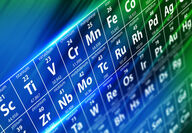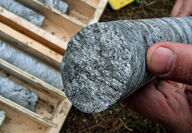Sorted by date Results 276 - 300 of 518

Rhenium is exceptionally resistant to heat and wear, characteristics that make it a vital ingredient in superalloys used in jet and industrial gas turbine engines. "The high-temperature properties of rhenium allow turbine engines to be designed with finer tolerances and operate at temperatures higher than those of engines constructed with other materials," the United States Geological Survey penned in a fact sheet on the critical metal. "These properties allow prolonged engine...

Cans, cups, roofs, and foil hats are likely the first things that come to mind when thinking about tin – none of which conjure images of a metal that should be considered critical to a modern country like the United States. According to a study carried out by Massachusetts Institute of Technology, however, tin is the metal expected that be most impacted by new technologies. Commissioned by Rio Tinto, the MIT study found that tin beat out more likely technology metals candidate...

Though gold is not considered a metal critical to the United States, this increasingly valuable precious metal could serve as a pathfinder element for several of the other minerals and metals the U.S. Geological Survey deemed critical to America. Selling for roughly US$2,000 per ounce and expected to climb much higher as central banks and governments inject unprecedented amounts of cash into a global economy affected by COVID-19, gold has become an increasingly vital...

Would you consider drinking heavy metals to make your stomach feel better? A serum containing arsenic, cadmium, lead or mercury would only make matters worse and could be deadly. Bismuth, the heaviest of the heavy metals, however, is swigged by millions of indigestion sufferers each year. In fact, stomach remedies such as Pepto-Bismol, along with cosmetic applications, are currently the largest market for bismuth. Being the only non-toxic heavy metal, bismuth is being...

Traditionally used to create stronger, lighter, and more durable steels, vanadium is emerging as a potential game changing element in the grid-scale batteries needed to store renewable energy. Known as vanadium redox flow batteries, or VRFBs, this emerging electrical storage technology takes advantage of vanadium's ability to exist in solution in four different oxidation states as electroactive elements, instead of separate elements for the cathode and anode. The amount of ene...

While the United States consumes roughly 5% of the chromite mined globally, none of this chromium mineral comes from domestic mines. Instead, America relies on foreign sources for approximately 72% of its supply and the balance of this vital ingredient in stainless steel and many superalloys comes from recycling. Nearly all America's chromite imports come from one country, South Africa. This heavy reliance on one country, coupled with a dearth of alternatives for this vital...

Considering the global shift to low-carbon energy and electric mobility, copper is the most vital metal not on the United States Geological Survey's list of 35 minerals and metals considered critical to America's economic wellbeing and security. Copper's importance is due to the rapidly emerging electric vehicle, wind turbines and photovoltaic (PV) solar technologies need a lot more copper than the combustion cars and power plants they are replacing. It is estimated that the...

Amongst the rarest of the stable elements on the periodic table and an important ingredient in the emerging thin-film solar panel sector, tellurium embodies what it means to be a metalloid – an element that possesses the properties of both a metal and non-metal – critical to the United States. "Most rocks contain an average of about 3 parts per billion tellurium, making it rarer than the rare earth elements and eight times less abundant than gold," the United States Geo...

Best known for its ability to resist heat and corrosion, antimony is in a wide array of consumer goods – from paints and plastics to batteries and wind turbines. This critical mineral is also used to make clearer glass for smartphones, computer screens and solar panels. "Today, antimony is used in lead-acid storage batteries for backup power and transportation; in chemicals, ceramics, and glass; in flame-retardant materials; and in heat stabilizers and plastics," the U.S. G...

The six platinum group elements – platinum, palladium, rhodium, ruthenium, iridium, and osmium – have one foot firmly planted in the realm of precious metals while the other is firmly established in the industrial sectors. While being amongst the rarest metals on the planet already makes PGE's highly valued for jewelry and bullion, their applications in the automotive, petrochemical, and electronics industries are catalysts that drive the price of these industrious pre...

Niobium and tantalum are nearly identical critical mineral twins with unique personalities that takes them on separate career paths in the defense, energy, high-tech and medical sectors. "The leading use of niobium is in the production of high-strength steel alloys used in pipelines, transportation infrastructure, and structural applications," the United State Geological Survey penned in a 2018 report on the indispensable twins. "Electronic capacitors are the leading use of...

While indium is not part of the everyday lexicon, if you are reading this article on your smartphone, computer or tablet there is a very good chance you are looking at (or more accurately, through) indium right now. This is because indium-tin oxide is used as a transparent conducting film applied to virtually every flat-panel display and touchscreen computer, tablet, and smartphone on the market. This thin coating transforms incoming electrical data into an optical form, a pro...

The United States is heavily dependent on China and other foreign suppliers for its barite, a mineral critical to the petroleum sector. Barite derives from barús, the Ancient Greek word for heavy, owing to an exceptionally high specific gravity for a non-metallic mineral. It is this weight that makes barite a key element to the oil and gas sector and lands the mineral on USGS' critical list. "More than 90% of the barite sold in the United States was used as a weighting agent...

The United States imported more than 90% of the 1.4 million metric tons of titanium minerals it consumed during 2019. What the mass majority of this critical mineral was used for, however, may come as a surprise. While titanium's lightweight and extreme durability make it an excellent material for aircraft and high-performance sporting equipment, more than 90% of this mineral mined each year is used to impart a stark whiteness to a surprisingly wide variety of consumer goods w...

A semiconductor that will melt in the palm of your hand and has the ability to convert electricity directly into laser light, gallium is a cool critical metal that is an important ingredient in light emitting diodes (LEDs), new generation smartphones, thin-film solar cells, and medical devices. "The development of gallium arsenide as a direct band-gap semiconductor in the 1960s led to what are now some of the most well-known uses of gallium – in feature-rich, a...

While Alaska is regarded as a geological storehouse of minerals critical to the United States, it is less renowned as a current globally significant supplier of germanium, a zinc byproduct metalloid with optical qualities that make it an important ingredient in infrared and fiber-optics, and semiconducting properties being applied to quantum computing, and solar energy systems. "The extensive use of germanium for military and commercial applications has made it a critical...

With it becoming increasingly apparent that Joe Biden will be confirmed as the 46th President of the United States, Alaska Sen. Lisa Murkowski believes the coming years will be "interesting times" for the state's resource sectors. "There is near certainty that he is going to be taking office on Jan. 20, 2021," Alaska's senior senator said, referring to Biden, during the Resource Development Council for Alaska annual convention. "If he follows through on some of his campaign...

In a major setback for building a mine at the largest undeveloped deposit of copper, gold, and rhenium known to exist on Earth, the U.S. Army Corps of Engineers has denied federal permits for the Pebble project in Southwest Alaska. Pebble has been roiled in controversy, largely due to its proximity to the Bristol Bay watershed, which hosts a world-class salmon fishery. Pebble proponents have said a modern mine could be developed that co-exists with fishery, while opponents...

Pebble Limited Partnership has submitted a compensatory mitigation plan for Pebble, which is the final piece needed for the U.S. Army Corps of Engineers to finalize a record of decision for the world-class copper-gold-molybdenum-silver-rhenium mine project in Southwest Alaska. Following publication of a Final Environmental Impact Statement for Pebble in July, the Army Corps sent Pebble Partnership a letter that details the need for "in kind" and "in watershed" mitigation for...

Ucore Rare Metals Inc., which has set a plan in motion to begin producing rare earth elements in Alaska by 2023, has shipped more than 1.5 metric tons of material from its Bokan Mountain project to Innovation Metal Corp.'s RapidSX facility in Ontario for concentration and REE separation testing. Ucore acquired Innovation Metals earlier this year and is operating the company as a subsidiary to further advance RapidSX technology for the separation and purification of rare earth...

The U.S. Geological Survey and Association of American State Geologists have approved $1.1 million of funding for mapping and geological surveys aimed at gaining a better understanding of Alaska's critical minerals potential. This funding includes $634,000 in grants to the Alaska Division of Geological & Geophysical Surveys for geologic mapping and geochemical analyses for an area of the Western Tanacross region near Alaska's eastern border with Canada's Yukon; and $500,000...

Constantine Metal Resources Ltd. came out on the winning side of a Ninth Circuit Court of Appeals ruling on a lawsuit brought by Southeast Alaska Conservation Council and others that challenged federal permits for road building on the company's Palmer zinc-copper-gold-silver-barite project near Haines, Alaska. "We believe the Ninth Circuit decided correctly on this matter and are pleased with the final decision," said Liz Cornejo, community liaison and advisor to Constantine...

Northern Dynasty Minerals first set its sights on Alaska's Pebble deposit in the 1990s. After acquiring the property in 2001, the company spent more than a decade and close to $1 billion proving it up as one of the greatest mineral resources ever discovered – certainly on American soil. Consider the following: • contained copper at Pebble is equivalent to ~1.3% of all the copper metal ever discovered or produced in the past 10,000 years; • contained gold at Pebble is equiv...

Graphite One Inc. Oct. 1 said President Donald Trump's declaration that the United States' heavy reliance on foreign nations for critical minerals is a national emergency highlights the importance of the company's plans to establish a domestic graphite supply chain by developing a mine at its Graphite Creek deposit in Alaska. The U.S. is 100% dependent on imports for graphite, which is currently the primary anode material in the lithium-ion batteries that power smartphones,...

Much like Mark Twain, who quipped, "The report of my death was an exaggeration," when informed of his obituary in an American newspaper, Politico's report of the untimely demise of the Pebble Mine project in Southwest Alaska was grossly overstated. On Aug. 22 Politico reported, "The Trump administration is planning to block the proposed Pebble Mine in Alaska early next week ... marking a surprise reversal that could be the death knell for the massive copper and gold project."...